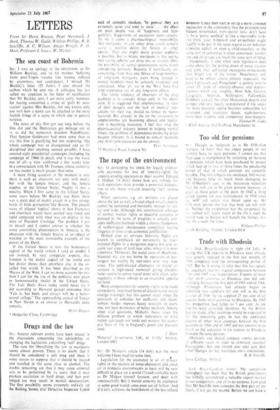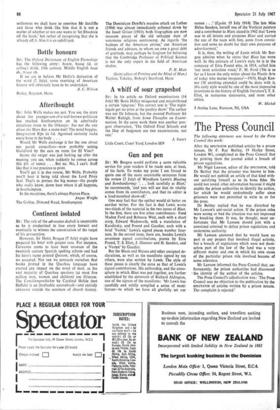Trade with Rhodesia •
r: Jock Bruce-Gardync is right (14 July) in ,.a■ Mg that UK exports to Rhodesia were already very greatly reduced in the first few months of :966. compared with the corresponding period of 965:But he is wrong to infer that this fact upsets rit_. argument that his original comparison between :*,66 and 1967 w as inappropriate. Exports of most ..:her oar) countries to Rhodesia also fell sub- • :an:ially between the first part of 1965 and of 1966. A;:hough Rhodesians had already begun to substitute new suppliers for old, still in the first quarter of 1966 the UK supplied 25 per cent of all exports from OECD countries to Rhodesia. By 1967 :his proportion had fallen to 7 per cent. As UK exports were curtailed, therefore. by the British ban on trade, other countries would be expected to rill the remaining gaps. In fact the additional exports of other ow) countries between the first quarters of 1966 and of 1967 did not amount to as much as the reduction in UK exports to Rhodesia between the same periods. Obviously one should compare similar periods of different years in order to eliminate seasonal fluctuations; but one should also take care that otherAanges do not invalidate one's conclusions. R. B. Sutcliffe Jesus College. Oxford Jock Brucc-G,:rdyne writes: My contention throughout has been that the British government has wilfully surrendered a valuable export market to our competitors, and all to no purpose. I am glad that Mr:Sutcliffe now concedes the first part of my thesis, if not yet the second. Before we can have a
settlement we shall have to convince Mr Sutcliffe and those who think like him that it is not a matter of whether or not one wants to let Rhodesia off the hook,' but rather of recognising that she is already off it. Alas it is an uphill task.































 Previous page
Previous page